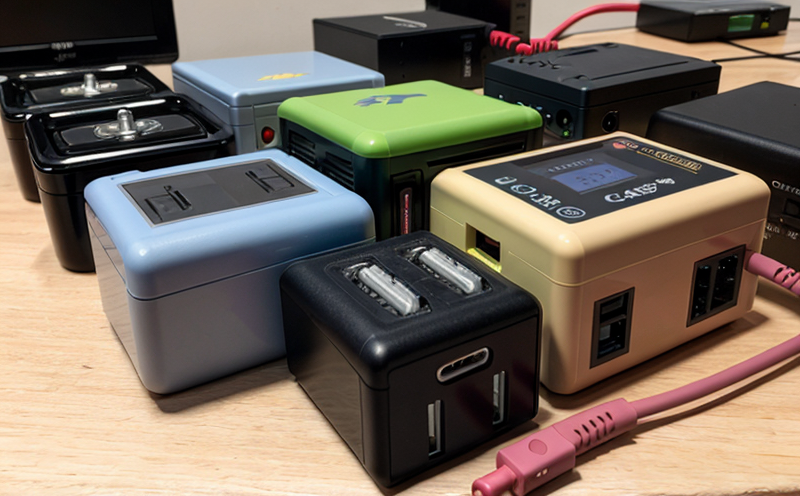Battery Management System (BMS) Safety Testing
The Battery Management System (BMS) is a critical component in ensuring the safe and efficient operation of rechargeable batteries used in consumer electronics, electric vehicles, and renewable energy storage systems. A BMS monitors battery performance parameters such as voltage, temperature, state of charge (SoC), and state of health (SoH). It also manages charging and discharging processes to prevent overcharging, overheating, or deep discharge that could lead to safety hazards.
The importance of BMS testing cannot be overstated. Failures in the BMS can result in thermal runaway, which may cause fires or explosions. This is particularly concerning for devices such as portable electronic gadgets and EVs where battery failures have led to significant recalls and safety concerns. Testing ensures that these systems meet international standards for safety, reliability, and performance.
The testing process involves a series of rigorous procedures aimed at evaluating the BMS's ability to protect against overcurrent, overvoltage, under-voltage, short-circuiting, and overheating conditions. This includes checking the BMS’s ability to balance cell voltages in multi-cell battery packs and its response during abnormal operating conditions.
Our laboratory uses advanced equipment and methodologies to conduct thorough testing of BMS components and overall system performance. Our team of experts ensures compliance with relevant international standards such as IEC 62137, UL 1973, and ISO/IEC 17025. This guarantees that the results are accurate, reliable, and meet industry benchmarks.
| Parameter | Description |
|---|---|
| BMS Monitoring Capabilities | Testing for voltage, current, temperature, SoC, and SoH monitoring accuracy. |
| BMS Control Functions | Evaluation of charging and discharging control algorithms under various conditions. |
| Thermal Management | Assessment of BMS's ability to manage heat during overcurrent or overvoltage situations. |
| Cell Balancing | Verification that the BMS can balance cell voltages in a multi-cell battery pack. |
| Fault Detection and Recovery | Evaluation of fault detection mechanisms and recovery capabilities during abnormal conditions. |
The testing process also involves real-world simulations to ensure the BMS's reliability under various operating scenarios. This includes endurance tests, stress tests, and environmental condition tests such as temperature cycling and humidity exposure.
- Endurance Tests: These simulate long-term use conditions to evaluate the BMS’s stability over time.
- Stress Tests: Designed to push the BMS beyond normal operating parameters to detect potential weaknesses or failures.
The data collected during these tests is analyzed using statistical methods and compared against predefined acceptance criteria. Only systems that meet these stringent standards are certified for safety and reliability.
Applied Standards
BMS safety testing must adhere to a set of internationally recognized standards to ensure the highest level of quality and compliance with industry regulations. The primary standards we follow include:
- IEC 62137: 2015 - This standard provides guidelines for the safety aspects related to portable rechargeable batteries.
- UL 1973: This Underwriters Laboratories standard covers lithium-ion battery packs and modules used in consumer electronics.
- ISO/IEC 17025: 2017: Ensures that our testing laboratory meets the criteria for competence to perform calibration or testing services.
- EN 62384-1:2015: This European standard provides requirements and recommendations for safety of portable rechargeable batteries used in electric vehicles.
By adhering to these standards, we ensure that the BMS testing conducted at our laboratory meets global quality benchmarks and regulatory requirements. Our expertise lies in understanding how these standards apply specifically to consumer product and safety testing within the context of battery management systems.
Scope and Methodology
| Parameter | Description |
|---|---|
| Battery Voltage Monitoring | Evaluation of the BMS's ability to accurately monitor battery voltage under various charge and discharge conditions. |
| Battery Current Monitoring | Assessment of the accuracy of current measurement in both charging and discharging modes. |
| Temperature Sensing | Evaluation of the BMS's ability to monitor temperature across all cells within a battery pack. |
| Battery State of Charge (SoC) | Verification that the BMS can accurately determine and report the remaining charge in a battery pack. |
| Battery State of Health (SoH) | Evaluation of the BMS's ability to assess the health status of individual cells within a multi-cell pack over time. |
The methodology for testing Battery Management Systems involves several key steps:
- Initial Setup: The battery system is calibrated and configured according to specific test protocols.
- Data Collection: Multiple sets of data are collected during various operating conditions, including charging, discharging, and idle states.
- Analysis: The collected data is analyzed against predefined acceptance criteria using statistical methods.
- Reporting: Comprehensive reports are generated detailing the results of each test and any deviations from acceptable performance levels.
This approach ensures that every aspect of the BMS's functionality is thoroughly evaluated, providing a robust foundation for certification and compliance.
Quality and Reliability Assurance
- Data Accuracy and Consistency: We ensure that all test data collected during each session is accurate and consistent to provide reliable results.
- Repeatable Tests: Each parameter is tested multiple times under identical conditions to verify repeatability and consistency of the BMS's performance.
In addition to these technical aspects, we also implement several quality control measures:
- Calibration Checks: Before each test session, all equipment used in testing is calibrated to ensure precise measurements.
- Environmental Controls: The laboratory maintains controlled environmental conditions such as temperature and humidity to simulate real-world operating environments accurately.
- Independent Review: All results are reviewed by multiple experts to ensure accuracy and consistency before final certification.
This commitment to quality and reliability ensures that the BMS testing we perform is not only accurate but also meets the highest standards of safety and performance.





